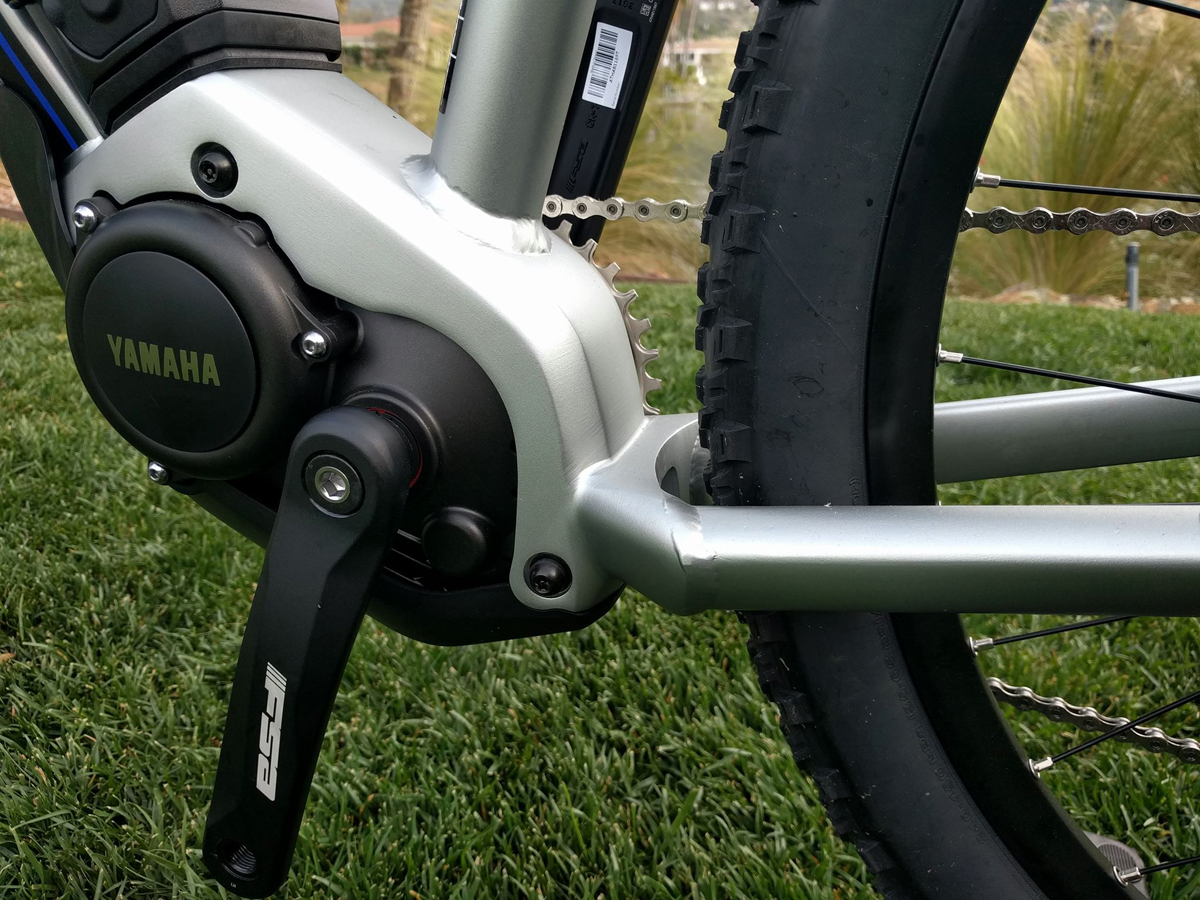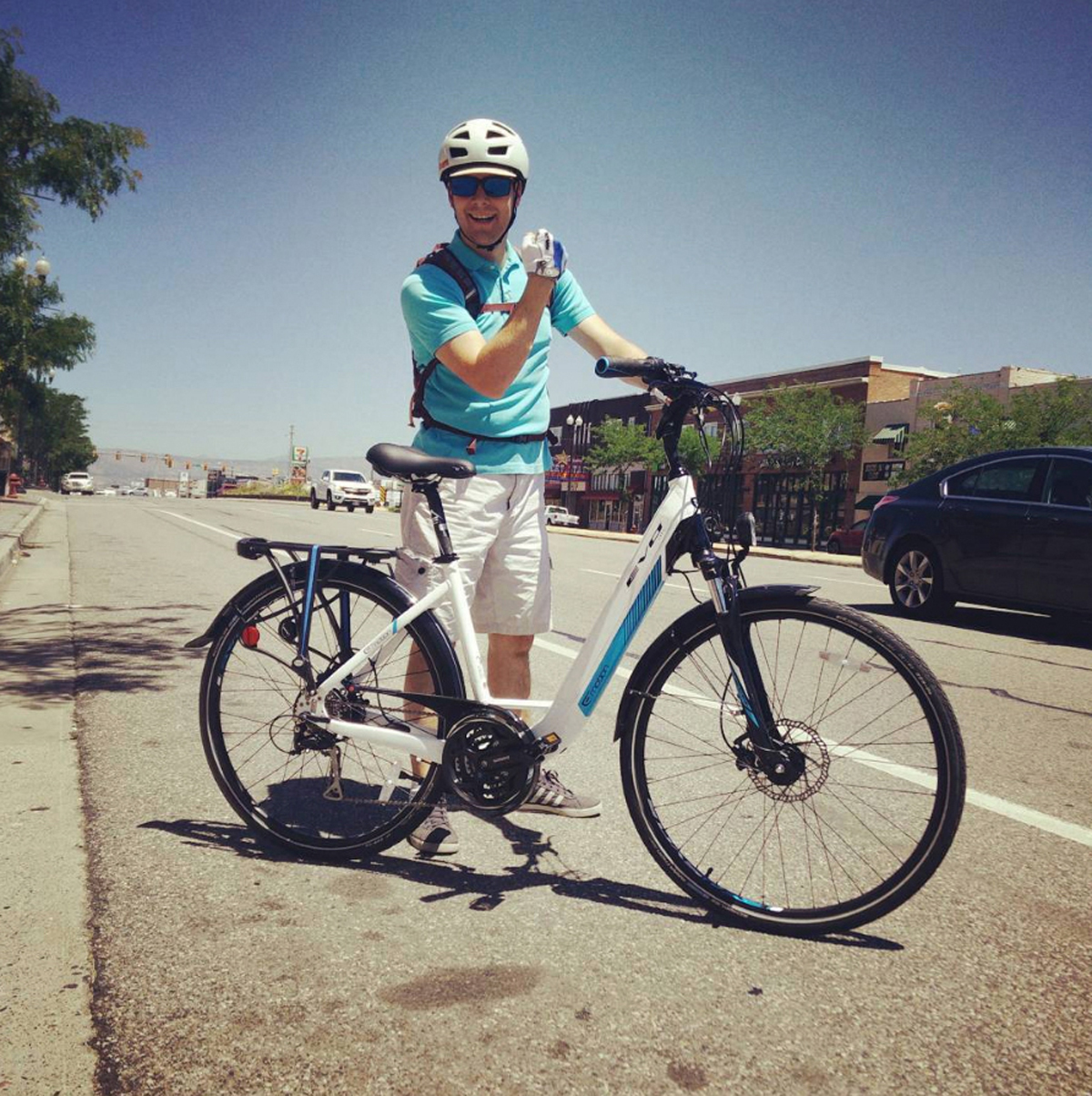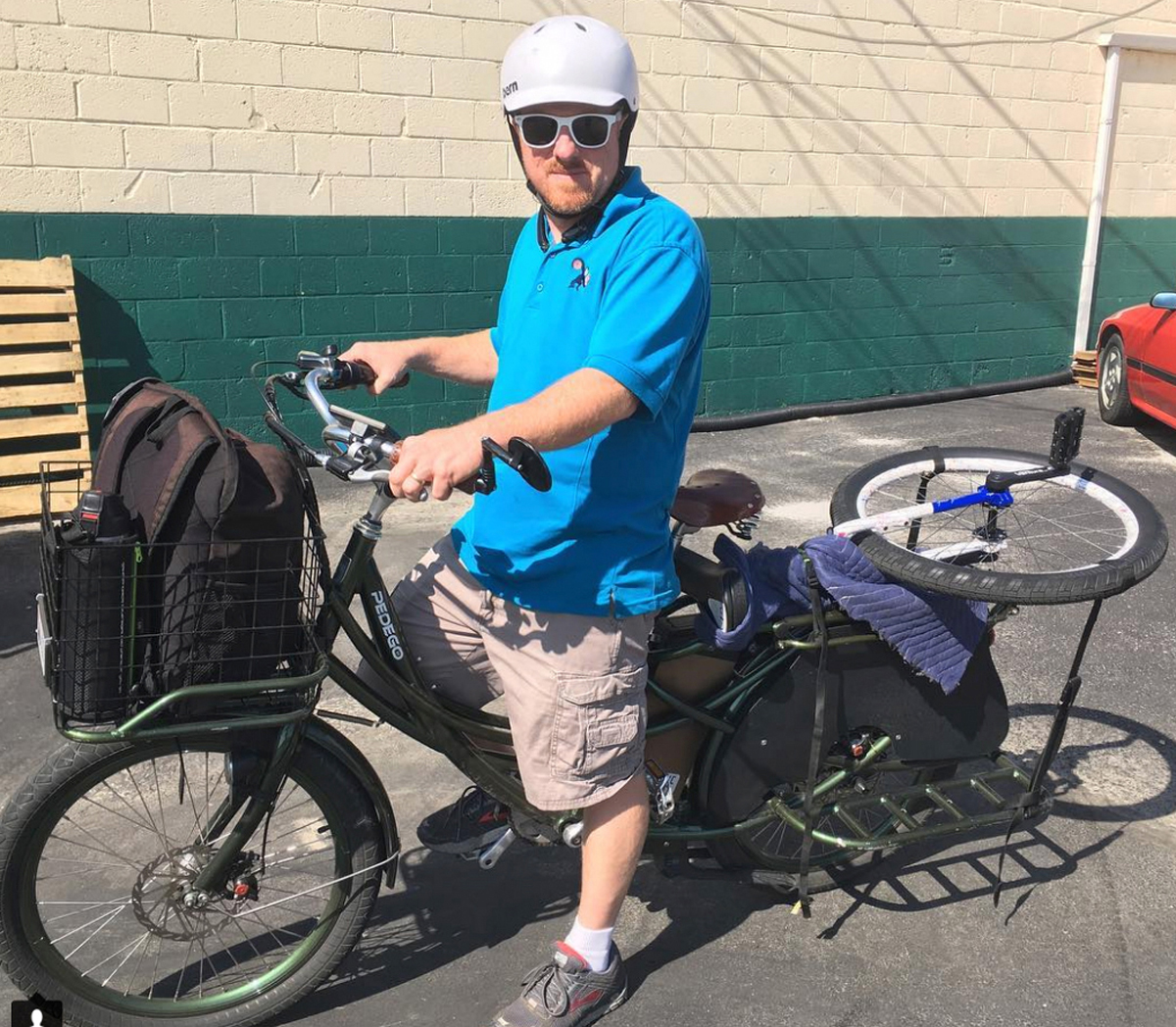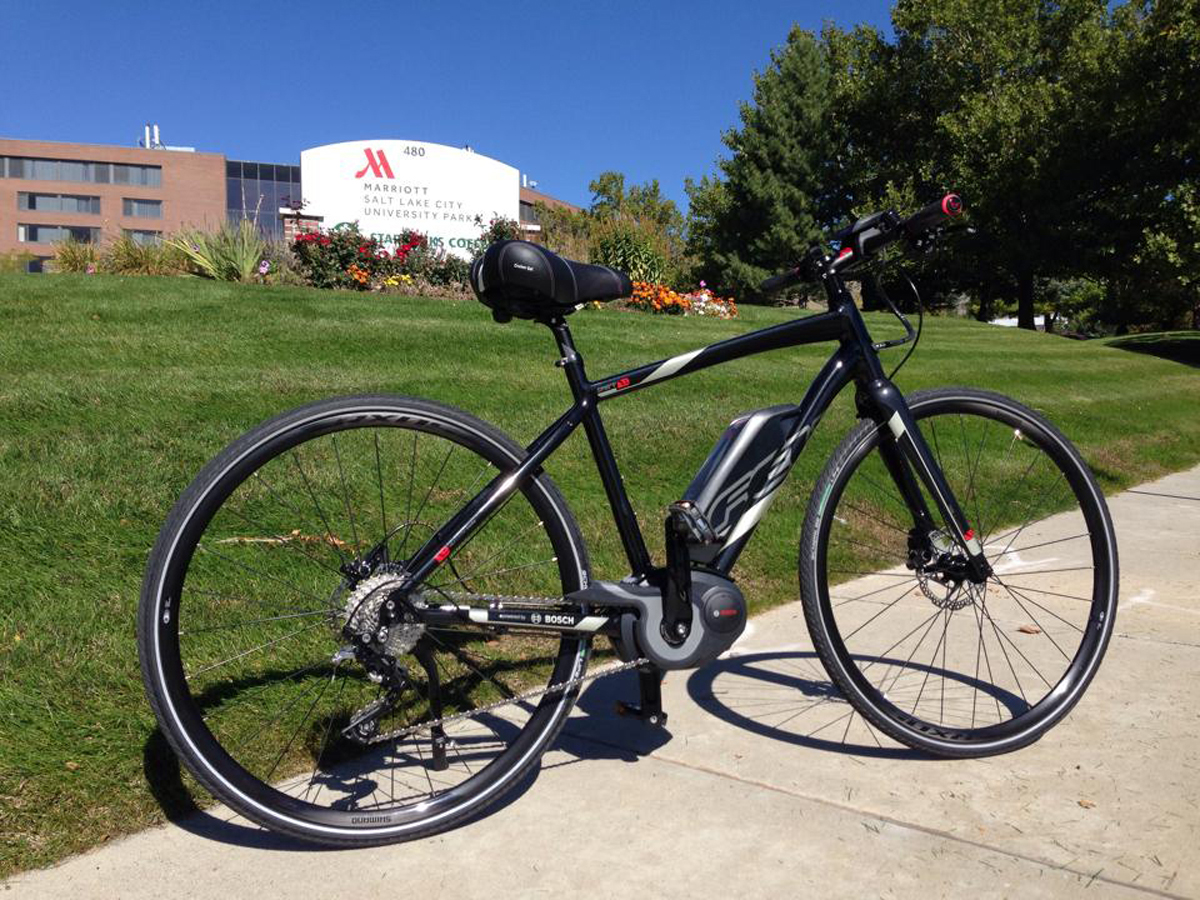By Joey Geurts and Duane Schaffer — Electric bikes, also known as e-bikes, are rising in popularity with approximately 7% of US bike sales last year. They are a great way to get around town and can make the commute to work or to the grocery store just a little bit easier. They don’t eliminate exercise, you just get there a little faster and a little easier. There are many reasons to get an ebike, and along with that, many decisions that go into purchasing one. Cycling West asked Blue Monkey Bicycles, an all electric bicycle retailer located in Murray, Utah to go over the reasons for purchasing an ebike, the types of bikes available, and the considerations for what type of bike to buy, and how much to spend.
Why should you get an electric bike? Why should you get one even if you own other bicycles?
When a person gets on an ebike for the first time, there is an inevitable smile that crosses their lips. The bicycle is arguably the most incredible invention ever but when you mix it with modern technology that helps propel you faster and further, it creates a sensation like no other. If you already own and ride traditional bicycles, an ebike is a natural step to relying on your car even less. Your commute becomes quicker and less sweat inducing and that trip to the grocery store becomes a fun activity. The extra speed and help of the motor allows you to carry those groceries and leave your car in the garage one more time.
What do you look for when shopping for an ebike?
Shopping for an ebike can be daunting. They are becoming more and more accepted and new brands are popping up constantly. Now the big names in the bicycling world are offering ebikes along side smaller companies that started out building only electric bikes.
The first thing to look for is stability of the company behind the bike or brand. Since many of the systems have proprietary parts, you want a company that will be around when it’s time to replace your battery or you need repair parts. Many cheaper ebikes are basically disposable as you won’t be able to get replacement parts for them.
Secondly, focus on your main intent or usage. Have a purpose in mind. There is always a bigger, better, or more expensive ebike out there, and when you start looking it might be tempting to find something that offers you more and more. But in the end, you don’t want to spend more money than you need to for unnecessary features, especially since these ebikes are designed to last you for years and years to come.
And finally, you don’t have to buy the first ebike you ride. All ebikes are a lot of fun and will put a smile on your face the moment you use that pedal assist or throttle. Even the sub par ones. Make sure to compare and contrast all the options that sound good to you before putting the money down on such a purchase. Not all ebikes are created equal, and countless variables can make for bikes that have a day and night difference in how they feel and ride, so make sure you are doing some type of comparison. Ride several and go with the quality ebike that feels the best and fits your budget.

How do you choose? Choose what fits your type of cycling the best.
If you come from the cycling world and want a great, natural, and intuitive feel, then you will probably want to choose what is known as a “mid drive” (motor mounted in the bottom bracket) option with a torque based pedal assist. These have been made popular by Bosch, Yamaha and Brose. A torque based pedal assist is a type of pedal assist that works as a reward system. The motor only gives back what you put into it to help you out, so you are still getting the cardio and heart rate exercise aspect of traditional cycling, you are just able to go faster and further. Couple this with the balance of the weight of the motor down low and squarely in the middle, and you will feel like a natural on one of these. Ebikes like this appeal great to commuters and mountain bikers, which is why so many commuting and mountain ebikes are mid drive. Oh, another good thing about mid drives is traditional wheel sets. No need to unplug a motor cable to change a tire!

Another common set up is what’s called the hub drive (motor is in the hub of the wheel, usually but not always in the rear). This has a kind of rear-wheel-drive-get-up-and go feeling. This is for the person that wants to have fun on the weekend, and may not necessarily want to pedal a lot. These bikes typically have a throttle and are a real kick to ride around. This setup is for someone that wants to really feel what its like to ride something electric, go fast off the line, or even those that want to take it easy or rehabilitate. Some people just like the concept that they can challenge themselves to pedal as far as they can knowing that they can engage the throttle and get back home or up that last hill. Hub motor bikes are also popular commuter bikes.

Are there other kinds?
Every kind of cycling is now represented with ebikes. Just like conventional bicycles, you have cargo ebikes, fat tire ebikes, e-trikes, hardtail and full suspension mountain bikes, commuter and even electric drop bar road bikes. The list goes on and on. There are also electric vehicles that blur the line between bicycle and scooter. High speed ebikes are commercially available but they are only allowed off road. You’ll find that the most common ebikes comply with Utah law which states that any bike up to a 750 watt motor and a 28 mph top speed is considered a bicycle and can be ridden where regular bicycles are allowed.

So how long do the batteries last?
Great question. It all varies and depends on many factors. The easy answer is a good quality ebike should be able to go at least 30 miles of full assist riding on a full charge. All the ones we carry at our store do. You may see many brands advertise insane numbers like +100 miles on a charge, but what they don’t tell you unless you follow the little asterisk is that many times those numbers are created using low level modes of pedal assist like “eco” mode and lot’s of pedaling on flat ground. A best case scenario. We range test every brand and model that comes through our store on full assist or throttle, trying to eat the most battery so you can have an idea what you can expect under extreme conditions. We would rather under promise and over deliver I guess.
Now if you’re asking about the life of the battery itself, that can vary on how you treat it. Bring the battery indoors like a laptop or cell phone when you charge it. Don’t let the battery sit in the cold winter garage or in the hot sun during the day. This will help insure that you get years usage from your battery and really protect your investment. You can ride in any temperature but just make sure that you store the battery above 40 degrees. They prefer that. Today’s Lithium Ion batteries can be charged at any time and for any amount of time. You don’t need to drain them fully like the old NiCads. Generally, a battery will get to 80% charge from empty in an hour and a half and then another 3 hours or so will build up a charge for distance. Batteries are usually completely charged in 4-5 hours.
How much should you spend?
Again, this comes down to what fits your individual needs best. There are ebikes for well over $10,000 all the way down to less than $1,000. On average, most customers usually end up deciding on something in the $2,500-$3,500 range. Does that mean a $1,500 ebike is terrible? Not necessarily. It just might be stripped down or have lesser components, but if there are things you don’t need for your ride (like a rear suspension for a commuter) then don’t pay for it. The good news for the consumer, as with any electric product, is that battery prices are indeed coming down. A couple years ago, we couldn’t find anything we liked under $2000. Now there are several bikes in that price range that meet our approval. Keep this in mind though: You get what you pay for with ebikes. By the time you add a lithium ion battery, motor, controller, and a quality company to back it up, you will be going well north of $1000. Add in quality bike components and you can see how costs will start climbing. When speaking of lower priced ebikes something will always be sacrificed.
Anything else to add?
Ebikes can help existing riders go faster and further than traditional bikes and use their car less but ebikes provide another benefit that helps the whole cycling community – bringing more people to the wonderful world of cycling. The more people out riding bicycles, the more bicycles will be taken seriously as a viable transportation option. If bikes are seen as transportation, more infrastructure will be approved and society’s grasp on the car will lessen a bit. Ultimately, the more active a society, the healthier it will be. We appreciate this chance to talk about ebikes. We’re making a difference one ebike rider at a time.

